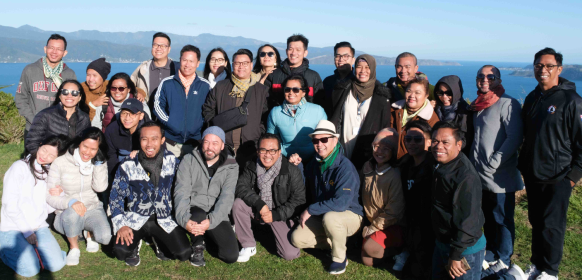Global Learning I: A Deep Dive into New Zealand’s Approach to Health and Racial Equity

The 2024 Equity Initiative Fellows traveled to New Zealand for Global Learning I to explore health equity as well as historical, cultural and diversity perspectives outside of Asia. Held May 3-11, this was the first time for the Equity Initiative to hold a program event in New Zealand, and Fellows found their encounters with indigenous Māori culture offered a new window for them to explore issues related to health and racial equity.
The indigenous Māori culture is an essential part of New Zealand’s story, as the Fellows discovered upon arrival and throughout the week. After a welcome ceremony (pōwhiri), Fellows were given an introduction to the Māori approach to health equity as Kerry-Leigh Dougall, Chief Maori Health Officer at the Department of Corrections spoke about Promoting Community Resilience. Fellows ended the day at Te Rau Karamu Marae with dancing and singing, in the communal tradition of preparing and enjoying dinner together.
Other days’ programming included site visits to hear about the local experience tackling the social and economic determinants of health, eliminating disparities for Māori in the criminal justice system, and addressing primary healthcare. Site visits were hosted by three organizations – Kōkiri Marae, Wellington Community Corrections, and Tū Kotahi – and Fellows found much common ground to explore as hosts generously shared their perspectives and experiences.
Fellows also had time to focus on leadership in deep discussions with Professor Des Gorman on Reforming the Health System for Equity and Julia Whaipooti, an advocate for advocacy and community mobilization, on Championing Social Justice: A Leadership Perspective.
At end-of-day debriefings and reflections, each day’sthought-provoking experiences often came back to the same question: What could each Fellow learn and bring back to their own context? Yusridar "Angie" Mustafa (Indonesia) provided one response based on her encounter with the Māori community: “connection, family and spiritual development,” key components for a truly holistic approach to community health. Fellow Nitipat “Ong” Pholchai (Thailand) encapsulated the week’s learnings and experiences with the word “roots,” an apt description of revisiting and relearning each Fellow’s core beliefs while visiting a new land.
Fellows will continue to process their insights during Global Learning II, at Harvard University in the United States in early June.
